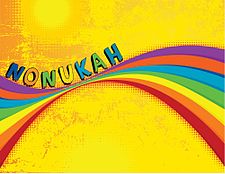- Nonukah
-
Nonukah is a widely celebrated holiday marking the end of the eight days of Hanukah and the beginning of the 358 days of the year that are not Hanukah[1]. Comparable to the unbirthday, Nonukah can be celebrated on any day that is not actually Hanukah though some sects of celebrants (known as Nonukah Purists) will only celebrate Nonukah on the first day after the conclusion of Hanukah. While Nonukah is celebrated by people of all faiths and cultural backgrounds its origins are in modern cultural Judaism.
Contents
Etymology
The root of the term 'Nonukah' is derived from the Latin nona meaning nine. Indicating the original day of celebration for this holiday was the ninth night of Hanukah. The Hebrew root for the word Hanukah (H.N.K.) means to begin, or initiate. It is also commonly thought that the hybrid word comes from the combinations of 'not' and Hanukah. This may be true however some of the original information about Nonukah has been unable to be verified by a reliable source.
Origins
Nonukah is one of the newest holidays to have gained international acclaim[2]. The first confirmed Nonukah celebration took place in 1999 in Jerusalem, Israel however due to the similar sounding name many participants believed they were celebrating Hanukah and the mistake was regarding the date. Since its inception Nonukah has been celebrated by thousands in countries all over the world. In addition to celebrations in the Diaspora a central Nonukah festival occurs annually. The yearly celebration has traditionally moved locations on a perennial basis however since 2004 the fundamental Nonukah celebration has occurred in Santa Monica, CA[3].
Holiday Tenets & Practices
Nonukah has evolved into a holiday that has focused on four main tenants
- Festivity: The holiday of Nonukah does not celebrate the death or birth of a specific person, nor does it mark the remembrance of a war or other military event. Nonukah is a joyous festival holiday where participants (known as celebrants) observe the holiday through dancing, imbibing of spirits and other assorted merriment.
- Unity: As a holiday with roots in the international city of Jerusalem, celebrants travel from all over the world to make a pilgrimage to be amongst a group of people. Borrowing from the Jewish concept of minyan (quorum), the philosophy behind this tenet is that anywhere people gather together to celebrate Nonukah is a holy space.
- Creativity: Nonukah's Judaic roots are also augmented by substantial cultural contributions by new age hippies (also referred to as funksters, or sometimes with a definite article the hippies). Groups of hippies have reinforced the tenet of creativity through the custom of "Party Apparatus Construction".
- Kindness: Nonukah is a holiday that reminds us how lucky we are to be able to share joy with the people around us. It also recognizes that through kindness, joy can only be magnified.Party Apparatus Construction
One tradition of Nonukah dating back to the first celebration is the practice of creative construction of party apparati, identified as any item created during Nonukah or in preparation for Nonukah with the practical (or impractical) goal of imbibing Nonukah spirits via non traditional means.
Traditional Foods
- Broccoli Cheese Casserole: Both broccoli and cheese have been favorite foods of celebrants since one of the first festivals in the United States. However traditionally the broccoli cheese casserole is made with Velveeta (which isn’t actually cheese; it can be found in the baking supplies aisle). To emphasize unity and kindness a common practice has become passing the full casserole dish around the celebration and consuming it with one communal fork.
- Fried Foods: The tradition of eating fried foods can be traced back to the Jewish holiday of Hanukah (a holiday recognizing a miracle that occurred with oil) and as such fried potato pancakes are a commonly fried food at the celebration. Additionally to emphasize creativity many additional foods are brought out as is a deep fryer and celebrants are encouraged to make their own fried creations.
- Local, Seasonal Fruits & Vegetables: One of the more recently adopted traditions has been to visit farmers in the local community the day after the festival itself and sample local, seasonal foods. This Santa Monica location of the central festival for the last five years has been a major contributing factor to this tradition.See also
- Festivus
- Hanukkah Harry
- Jewish holidays 2000-2050
- Rainbow Family
References
- ^ "The History of Hanukkah". History Channel. http://www.history.com/content/hanukkah=. Retrieved 2010-02-03.[dead link]
- ^ "Diversity Calendar" (December 2005). Cincinnati Magazine 39(3): 66. ISSN: 0746-8210.
- ^ "Nonukah in Santa Monica". Your Sweet Bippy. http://sweetbippy.blogspot.com/2007/04/blog-post.html=. Retrieved 2010-02-19.[dead link]
External links
Categories:- Jewish holy days
Wikimedia Foundation. 2010.

